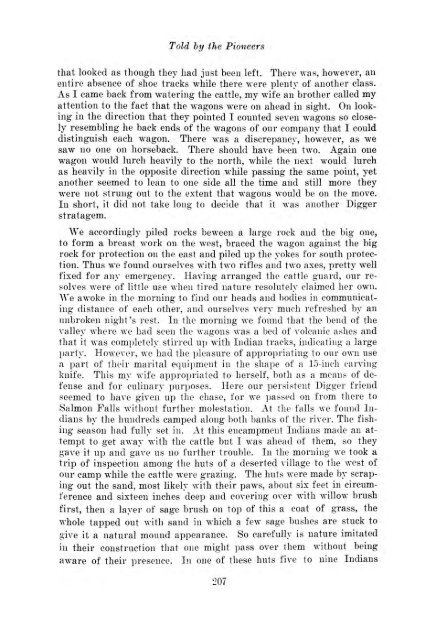Told by the Pioneer's - Washington Secretary of State
Told by the Pioneer's - Washington Secretary of State
Told by the Pioneer's - Washington Secretary of State
Create successful ePaper yourself
Turn your PDF publications into a flip-book with our unique Google optimized e-Paper software.
<strong>Told</strong> <strong>by</strong> <strong>the</strong> Pioneers<br />
that looked as though <strong>the</strong>y had just been left. There was, howe\'er, an<br />
entire absence <strong>of</strong> shoe tracks while <strong>the</strong>re were plenty <strong>of</strong> ano<strong>the</strong>r class.<br />
As I came back from watering <strong>the</strong> cattle, my wife an bro<strong>the</strong>r called my<br />
attention to <strong>the</strong> fact that <strong>the</strong> wagons were on ahead in sight, On looking<br />
in <strong>the</strong> direction that <strong>the</strong>y pointed I counted seven wagons so closely<br />
resembling he back ends <strong>of</strong> <strong>the</strong> wagons <strong>of</strong> our company that I could<br />
distinguish each wagon. There was a discrepancy, however, as we<br />
saw no one on horseback. There should have been two. Again one<br />
wagon would lurch heavily to <strong>the</strong> north, while <strong>the</strong> next would lurch<br />
as heavily in <strong>the</strong> opposite direction while passing <strong>the</strong> same point, yet<br />
ano<strong>the</strong>r seemed to lean to one side all <strong>the</strong> time and still more <strong>the</strong>y<br />
were not strung out to <strong>the</strong> extent that 'wagons would be on <strong>the</strong> move.<br />
In short, it did not take long to decide that it was ano<strong>the</strong>r Digger<br />
stratagem.<br />
'Ve accordingly piled rocks beween a large rock and <strong>the</strong> big one,<br />
to form a breast work on <strong>the</strong> west, braced <strong>the</strong> wagon against <strong>the</strong> big<br />
rock for protection on <strong>the</strong> east and piled up <strong>the</strong> yokes for south protection.<br />
Thus ,,'e found ourselves with two rifles and two axes, pretty well<br />
fixed for an~' emergency. Having arranged <strong>the</strong> cattle guard, our resolves<br />
were <strong>of</strong> little use when tired nature resolutelY claimed her own.<br />
•<br />
'Ve awoke in <strong>the</strong> morning to find our heads and bodies in communicating<br />
distance <strong>of</strong> each o<strong>the</strong>r, and ourseln.'s very much refreshed <strong>by</strong> an<br />
unbroken night's rest. In <strong>the</strong> morning we found that <strong>the</strong> bend <strong>of</strong> <strong>the</strong><br />
"alley where we had seen <strong>the</strong> wagons was a bed <strong>of</strong> volcanic ashes and<br />
that it \vas completely stilTed up with Indian tracks, indicating a large<br />
party. Howen~r, we had <strong>the</strong> pleasure <strong>of</strong> appropriating to our own use<br />
a part <strong>of</strong> thpir marital equipment in <strong>the</strong> shape <strong>of</strong> a 15,ill('h earving<br />
knife. This my wife appropriated to herself, hoth as a means <strong>of</strong> defense<br />
and for culinary purposes. Here our persi;.:tent Digger friend<br />
seemed to have giYen up <strong>the</strong> chase, for we passpc! on from <strong>the</strong>re to<br />
Salmon Falls without fur<strong>the</strong>r molestation. At <strong>the</strong> falls we found Indians<br />
<strong>by</strong> <strong>the</strong> hundreds camped along both hanks <strong>of</strong> <strong>the</strong> river. The fishing<br />
season had fully set in. At this encampment Indians made an attempt<br />
to get away with <strong>the</strong> cattle but I was ahead <strong>of</strong> tlwm, so <strong>the</strong>y<br />
gaye it up and gave us no fur<strong>the</strong>r trouble. In <strong>the</strong> morning we took a<br />
trip <strong>of</strong> inspection among <strong>the</strong> huts <strong>of</strong> a deserted village to <strong>the</strong> \vest <strong>of</strong><br />
our camp while <strong>the</strong> cattle were grazing. The huts were made <strong>by</strong> scraping<br />
out <strong>the</strong> sand, most likely with <strong>the</strong>ir paws, about six feet in circumference<br />
and sixteen inches deep and covering O\'er with willow brush<br />
first, <strong>the</strong>n a layer <strong>of</strong> sag'e brush on top <strong>of</strong> this a coat <strong>of</strong> grass, <strong>the</strong><br />
whole tapped out with sand in which a few sage bushes are stuck to<br />
give it a natural mound appearance. So carefully is nature imitated<br />
ill <strong>the</strong>ir construction that one might pass over <strong>the</strong>m without being<br />
aware <strong>of</strong> <strong>the</strong>ir presenc('. In one <strong>of</strong> <strong>the</strong>se huts five to nine Indians<br />
:207
















